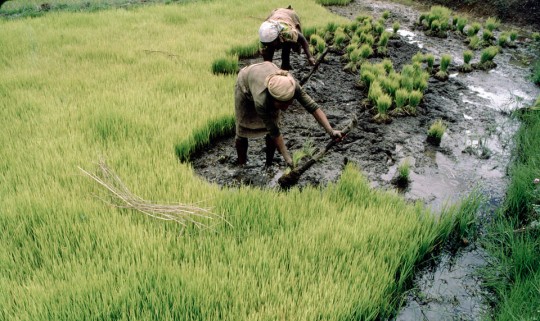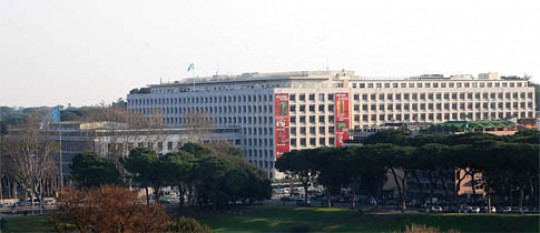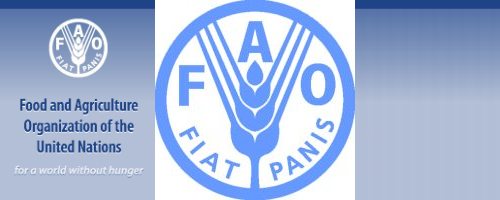Corruption leading to unequal access, use and distribution of land – UN report
Corruption leading to unequal access, use and distribution of land – UN report

Corruption caused by weak governance is leading to unequal land distribution and poor resource management, according to a United Nations report released today, which argues that this lack of transparency is undermining social stability, investment and growth in developing countries.
Weak land governance occurs as a result of low levels of transparency, accountability and the rule of law, the report says, which strains “the rules, processes and institutions that determine which land resources are used, by whom, for how long, and under what conditions.”
The report, jointly produced by the UN Food and Agriculture Organization (FAO) and Transparency International, found that in more than 61 countries weak governance has increased the likelihood of corruption in land occupancy and administration, intensifying the impact of pressures on land use, agriculture and food security worldwide.
Secure access to land and protection of natural resources from unbridled use is one of the keys to ensuring food security, social stability, investment, broad-based economic growth and sustainable development.
“The findings of the paper reflect what we have been hearing for years from farmers, herders, investors, governments and non-governmental organizations (NGOs) in many developing countries – that where land governance is deficient, a high risk of corruption exists,” said FAO Assistant Director-General for Natural Resources Alexander Mueller.
“Secure access to land and protection of natural resources from unbridled use is one of the keys to ensuring food security, social stability, investment, broad-based economic growth and sustainable development,” Mr. Mueller added.
The report found that corruption in the land sector varied from small-scale bribes and fraud to high-level abuses of government power and political positions.
“When transparency and accountability are absent, the risk of corruption rises and threatens to turn land into a tool of alienation of ordinary people. As a result of corruption, people lose the cultural and economic benefits of their own land resources,” said Rueben Lifuka, President of Transparency International Zambia.
The report also notes corruption is increasing in the biofuel industry, as many countries with weak governance are considered attractive destinations for this type of investment. In Colombia, for example, the rapid expansion of oil palm cultivation has been linked to reports of paramilitaries, hired by private interests, allegedly pushing poor communities off their land to increase the available area for planting, and a State investigation found that at least 25,000 hectares suitable to plant oil palms had been illegitimately acquired by private interests.
The report underscores the importance of strengthening governance to ensure land benefits can be enjoyed by all citizens. FAO is currently working with its partners to improve land governance through proposed guidelines by the international community.
###
Corruption undermining land access, development
FAO and Transparency International release working paper, call for improved governance
12 December 2011, Rome – “Unprecedented pressures on land have been created as new areas are cultivated, taken over by expanding urban centres or abandoned due to degradation, climate change and conflict,” according to a paper jointly prepared by the UN Food and Agriculture Organization (FAO) and global corruption watchdog Transparency International (TI).
“These developments have strained the rules, processes and institutions that determine which land resources are used, by whom, for how long, and under what conditions,” the working paper reads.
Striking at one of the core issues affecting agriculture and food security worldwide, the findings of FAO and TI in more than 61 countries show that weak governance has increased the likelihood of corruption in land tenure and administration, and is intensifying the impact of pressures on land use.
“The findings of the paper reflect what we have been hearing for years from farmers, herders, investors, governments and NGOs in many developing countries — that where land governance is deficient, a high risk of corruption exists,” Alexander Mueller, FAO’s Assistant Director-General for Natural Resources.
“Secure access to land and protection of natural resources from unbridled use is one of the keys to ensuring food security, social stability, investment, broad-based economic growth and sustainable development,” Mueller added.
“Transparency and accountability contribute to a positive cycle of governance, ensuring that land resources benefit everyone and not only the powerful”, said Rueben Lifuka, President of Transparency International Zambia and a TI Board Member.
“However, when transparency and accountability are absent, the risk of corruption rises and threatens to turn land into a tool of alienation of ordinary people. As a result of corruption, people lose the cultural and economic benefits of their own land resources,” Lifuka added.
The working paper found corruption in the land sector varied from small-scale bribes and fraud to high-level abuses of government power and political positions.
The rush to invest in biofuels as a way to mitigate climate change is one of the pressures affecting land use in many countries, especially since “many countries with governance and corruption challenges are considered the most attractive destinations for biofuel investment,” according to the paper.
FAO and TI are planning further research and meetings on corruption in land tenure.
Improving land governance
The challenge of improving land governance is currently being addressed by FAO and its partners through proposed guidelines for the international community. The Voluntary Guidelines for the Responsible Governance of Tenure of Land, Fisheries and Forests in the Context of National Food Security are currently under discussion by the Committee on World Food Security (CFS).
###
> UN Food and Agriculture Organization (FAO).
The Food and Agriculture Organization of the United Nations (FAO) is an intergovernmental organization and has 191 Member Nations, two associate members and one member organization, the European Union. Achieving food security for all is at the heart of FAO’s efforts – to make sure people have regular access to enough high-quality food to lead active, healthy lives.

FAO’s mandate is to raise levels of nutrition, improve agricultural productivity, better the lives of rural populations and contribute to the growth of the world economy.
The Food and Agriculture Organization of the United Nations (FAO) is working with its Members and the entire international community for achievement of the Millennium Development Goals.
These eight goals – each with specific targets and indicators – are based on the United Nations Millennium Declaration, signed by world leaders in September 2000. They commit the international community to combating poverty, hunger, disease, illiteracy, environmental degradation, and discrimination against women.
![]()
The eight Millennium Development Goals are:
Goal 1: Eradicate extreme poverty and hunger
Goal 2: Achieve universal primary education
Goal 3: Promote gender equality and empower women
Goal 4: Reduce child mortality
Goal 5: Improve maternal health
Goal 6: Combat HIV/AIDS, malaria and other diseases
Goal 7: Ensure environmental sustainability
Goal 8: Develop a Global Partnership for Development
* More information at UN Food and Agriculture Organization (FAO)
###
> United Nations (UN).
 The United Nations was established on 24 October 1945 by 51 countries committed to preserving peace through international cooperation and collective security. Today, nearly every nation in the world belongs to the UN: membership totals 192 countries.
The United Nations was established on 24 October 1945 by 51 countries committed to preserving peace through international cooperation and collective security. Today, nearly every nation in the world belongs to the UN: membership totals 192 countries.
When States become Members of the United Nations, they agree to accept the obligations of the UN Charter, an international treaty that sets out basic principles of international relations. According to the Charter, the UN has four purposes:
- to maintain international peace and security;
- to develop friendly relations among nations;
- to cooperate in solving international problems and in promoting respect for human rights;
- and to be a centre for harmonizing the actions of nations.
###
* The above story is adapted from materials provided by United Nations (UN)
** More information at United Nations (UN)





















